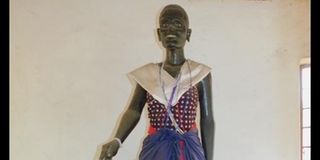Shakahola's link with Giriama's uprising against British colonial rule

A statue of Mekatilili wa Menza in Malindi, Kilifi County. Mekatilili is credited with the year-long Giriama Uprising and is still celebrated today for her heroic deeds.
Away from the shadow of cult deaths that looms large in Kilifi's Shakahola forest, archival records show that it is also the birthplace of the Coastal people's rebellion against British colonial rule.
Specifically, the Chakama area, where Shakahola Forest is located, was the home of Mekatilili wa Menza, the Giriama woman credited with leading the year-long rebellion against the colonialists.
The heroine of Kenyan history books was born near the Sabaki River in the 1840s.
Mekatilili led public meetings in Chakama, urging locals to oppose the British, who had introduced forced labour on plantations in 1913.
She is also credited with mobilising the Giriama to take oaths to fight the colonialists and resist their way of life.
Legend has it that she once slapped a British soldier and escaped, but was later arrested and imprisoned in western Kenya.
Mekatilili is credited with the year-long Giriama Uprising and is still celebrated today for her heroic deeds.
She died in 1925 and her statue was unveiled in Malindi town to honour her contribution to Kenya's struggle for independence.
Mekatilili wa Menza is also remembered for the Prophetess Mepoho's prophecy of the coming of strange people with air-like sisal fibre who moved in flying vessels as those who move on water and land.
The Mijikenda Kaya elders continue to preserve the Shakahola forest as a historical site.
The Kaya elders say they need to clean up the forest where more than 240 bodies of followers of controversial pastor Paul Mackenzie were dug up in mass graves last month. The preacher had convinced his followers to fast to death so that they could go to heaven. Many of them, including children, starved, while others were strangled, bludgeoned or suffocated to death.
The coordinator of the Mijikenda Kaya Elders Association, Mr Tsuma Nzai, said the name Shakahola was derived from two names, shaka and hola.
"Shaka means sorrow and hola means healed. In relation to colonial rule, it meant that we had been healed of our worries," Mr Nzai explained.
"After the operations to exhume the bodies from the secret graves, we will declare the Shakahola forest a historical site and shrine under the 'Kaya elders. No individual will be allowed to own the land," he said.
The coordinator said they would also propose to erect a tower to mark the spot where Mekatilili wa Menza slapped the British colonialist.
Mekatilili wa Menza was buried at Ulaya Kwa Jele village in Bungale in 1925.
For years, the Mijikenda community has commemorated Mekatilili wa Menza every August with a colourful three-day event.
Activities include peace walks by the elders.
Malindi Cultural District Association chairman Mzee Emmanuel Munyaya said the forest would remain a historical site for generations to come.
He said the elders would protect the forest to prevent further destruction and loss of life.
“The Mau Mau freedom fighters recognised Shakahola Forest as a home for the journey to freedom in Kenya and now we will preserve another history to tell generations about a pastor and his controversial teachings that turned the land into a graveyard,'' he said.





